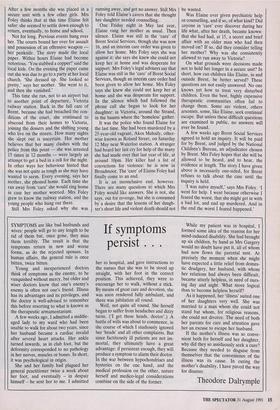If symptoms
persist .
SYMPTOMS are like bad husbands and wives: people will go to any length to be rid of them but, once gone, they miss them terribly. The result is that the symptoms return in new and worse forms, as do the rejected spouses. In human affairs, the general rule is once bitten, twice bitten.
Young and inexperienced doctors think of symptoms as the enemy, to be vanquished without mercy, but older and wiser doctors know that one's enemy's enemy is often not one's friend. Illness has its advantages and its privileges, and the doctor is well-advised to remember this before resorting to what is known as the therapeutic armamentarium. A few weeks ago, I admitted a middle- aged lady to my ward who had been unable to walk for about two years, since her husband became a cardiac invalid after several heart attacks. Her ankle turned inwards, as in club foot, but the deformity corresponded to no pathology in her nerves, muscles or bones. In short, it was psychological in origin. She and her family had plagued her general practitioner twice a week about her foot; and eventually – in despair himself – he sent her to me. I admitted her to hospital, and gave instructions to the nurses that she was to be stood up straight, with her foot in the correct position. This achieved, they were to encourage her to walk, without a stick. By means of great care and devotion, she was soon rendered fully ambulant, and there was jubilation all round.
Well, not quite all round. She herself began to suffer from headaches and dizzy turns. CI get these heads, doctor'.) A battle of wills was about to commence, in the course of which I studiously ignored her 'heads' and all other complaints. But since factitiously ill patients are not im- mortal, they ultimately have a great advantage: if persistent enough, they will produce a symptom to alarm their doctor. In the war between hypochondriacs and hysterics on the one hand, and the medical profession on the other, nature herself and medico-legal considerations combine on the side of the former. While my patient was in hospital, I formed some idea of the reasons for her mind-induced disability. She had brought up six children, by hand as Mrs Gargery would no doubt have put it, all of whom had now flown the parental nest. At precisely the moment when she might have expected a little relief from domes- tic drudgery, her husband, with whom her relations had always been difficult, became utterly helpless, in need of nurs- ing day and night. What more logical than to become helpless herself?
As it happened, her 'illness' suited one of her daughters very well. She was married to a man whom she could not stand but whom, for religious reasons, she could not divorce. The need of both her parents for care and attention gave her an excuse to escape her husband.
If the mother's illness was so conve- nient both for herself and her daughter, why did they so assiduously seek a cure? Because they needed to disguise from themselves that the convenience of the illness was its cause. In curing the mother's disability, I have paved the way for disaster.
Theodore Dalrymple










































 Previous page
Previous page